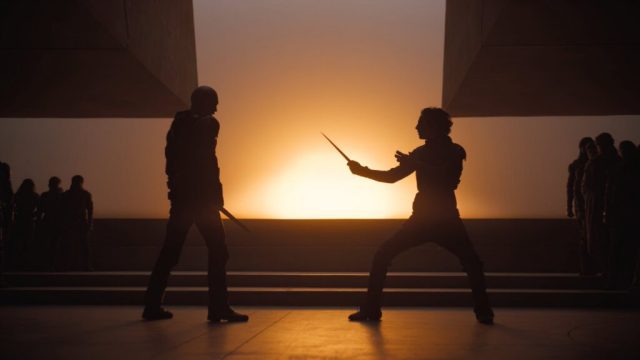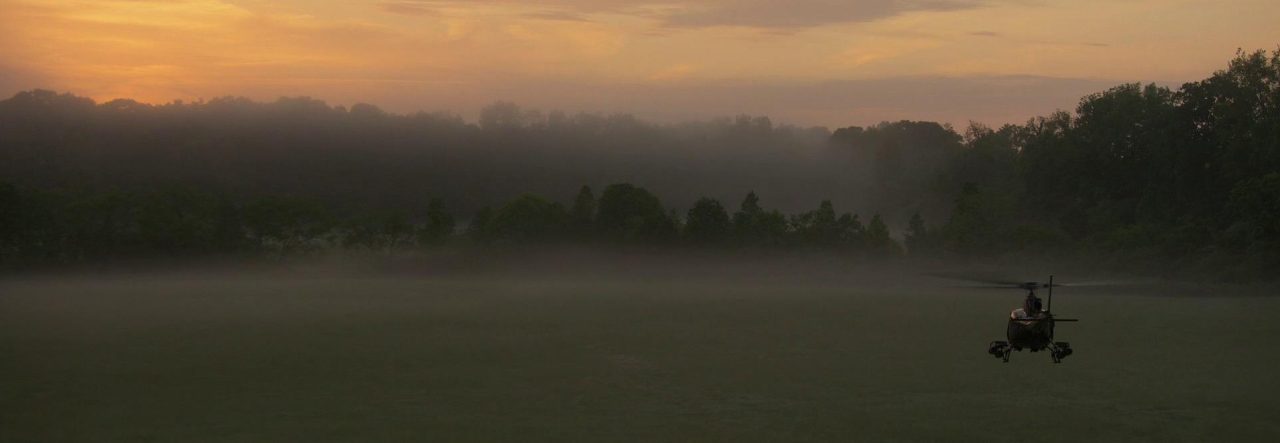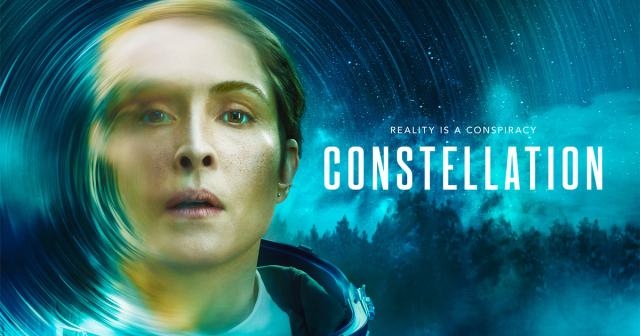 I’ve been mulling over Dune: Part Two over the past few weeks- I hesitated over writing this particular post because I’d originally intended to go see the film again but circumstances as usual got in the way of that (and indeed in the way of writing any posts here of late). I suppose I could wait for the film to arrive in our homes but I suspect that its arrival on 4K disc may be later than many hope (some folks are quoting May release dates but that seems a bit early).
I’ve been mulling over Dune: Part Two over the past few weeks- I hesitated over writing this particular post because I’d originally intended to go see the film again but circumstances as usual got in the way of that (and indeed in the way of writing any posts here of late). I suppose I could wait for the film to arrive in our homes but I suspect that its arrival on 4K disc may be later than many hope (some folks are quoting May release dates but that seems a bit early).
The funny thing is, Dune: Part Two has gotten me thinking of Tolkien fans, and Peter Jackson’s LOTR trilogy. The LOTR films were widely popular and hugely successful, admired by public and critics equally. They are great films, certainly better films than anyone had a right to hope for. I grew up part of that generation that thought that the book was unfilmable, and films such as Willow, Hawk the Slayer and Krull only seemed to prove it. They may have been enjoyable fantasy films, but they were widely perceived as hardly something to take seriously – and readers did take Tolkien’s book very seriously. But it was a different time, back then in the 1970s and 1980s, living in a world where we had limits- it feels these days like technology means anything is possible, they could make any book into a film now, the limits have gone even if the skills of the film-makers themselves haven’t scaled up with that tech. But when I was growing up it was clear LOTR just couldn’t be done without editing the book down into a pale shadow of itself- I remember reading in Starburst magazine of John Boorman trying to make it (he would make Excalibur instead) and remember being horrified by Ralph Bakshi’s ghastly animated version that only told half of the story.
Beyond the impossibly complicated logistics of bringing Tolkien’s epic canvas to the screen, there is also the issue of its complex lore- the detail and thought behind the page and woven within it (and all those appendices!) It isn’t ‘just’ a simple good versus evil adventure yarn. The films may have succeeded beyond most people’s expectations, but Tolkien purists can be very dismissive of them, and I understand that Tolkien’s son, Christopher Tolkien, really didn’t like the films at all. I suppose Christopher Tolkien and the Tolkien purists who so disliked the LOTR films are outliers though- many of the people who had read the book also loved the film, as did millions who had never read the book nor ever would.
For my part, I have always had a strange relationship with the LOTR films- I liked them, was impressed by them artistically and in awe of the sheer audacity of their scale and of them being made back to back. Not only did they make theatrical versions that worked, they even pulled off making extended editions that were arguably superior. I bought the films on DVD, Blu-ray and 4K, have the standard and extended soundtrack editions that came out (even bought the book ABOUT the music that came with yet ANOTHER compact disc). But I never really fell in love with the films, never considered them in any of my top ten lists over the years. Even to me this seemed odd. Yes I enjoy them whenever I watch them, particularly Fellowship of the Ring, which is all sorts of perfect and the best of the three. But I never fell in love with them- admiration , not adoration. They are not bad films, you understand, I’m not suggesting that at all. Is it because I read the book first and there’s always this other voice in my head, judging the films as adaptation as much as films on their own terms?
Which brings me to Villeneuve’s Dune films. Again, clearly not bad films- they look amazing, and are certainly sincere in adaptation, and Villeneuve is clearly one of the very best directors working today. Considering where Hollywood has been of late with regards its popcorn blockbusters, its amazing how the Dune films have turned out as well as they have.
But I don’t love them. There’s just… something wrong. And I think, like with regards those Tolkien purists, its because I read the book all those years ago and loved it so much. The pictures in my head will always be different to what is on the screen. Sometimes Villeneuve’s images are superior to whatever I imagined, sometimes less so- I think its just that in my head, the book was stranger. The story takes place 20,000 years in the future, a future so far off that all the technology in it seems like magic, and the characters while human are almost as alien as anything in the Star Wars cantina. In Villeneuve’s Dune, things often seem so… grounded, ordinary, relatable.
Well, of course it has to be relatable, it has to work with mainstream audiences not just hardcore sci-fi nerds who’ve been reading this stuff for decades. Its a decision that Jackson also made with his LOTR films, making buildings, costumes etc look grounded in the Viking-era or Medieval times in terms of ‘look’. Its just that in Villeneuve’s Dune, Arrakis seems so….
Ordinary? That might not be the right word here. But Arrakis does not feel as alien as I think it should (sure, giant sandworms not withstanding). I hoped for bigger space, stranger sounds, alien stars in a night sky of bizarre moons, a sense of somewhere unique and strange, the sheer distance of those 20,000- years and being on some impossibly distant world. The heat- I just never feel sense of the heat. Arrakis is deadly, but it never feels as hot as it purports to be. Dry and dusty, sure, but where’s the sweat, the scorched skin? Its a case of criticizing a film for what it isn’t, rather than what it is. Which is not at all fair and also possibly extremely pointless.
But both Dune films also remind me of the worst failings of Christopher Nolan; darling of the cinematic firmament as he is, it might seem foolish of me to have something negative to say about Nolan at all. But as I have noted before, his films always leave me cold and I just have such a similar feeling with the Dune films. I don’t FEEL anything. I don’t feel like I know any of the characters at all, any empathy with Paul or anyone, really, in the Dune films. Its like I’m coolly watching events unfold, and as technically profound as they may be, I just don’t feel involved in any of it. The Harkonnen attack on the Atreides in Part One looks impressive but I don’t feel any of the horror, the terror of it, that I should, and at the end of Part Two I don’t feel a cathartic sense of satisfaction with Paul’s victory, it doesn’t excite me (that last battle is also bloody short and anti climactic, the Fremen suddenly supermen and the Sardaukar suddenly weak and easily beaten). Maybe its Hans Zimmer’s music not working the way it might- most people seem fine with it but its curious that Zimmer composed scores for so many Nolan films too. Its gotten to the point now that Zimmer’s music has become so… generic? Which comes back to that nagging feeling I have that everything looks so ordinary- impressive, sure, but… you know, some of Lynch’s film, for all its own faults, some of its art direction at least looked more strange and unworldly, and the same applies to the music, maybe. I’m not suggesting that Villeneuve’s films needed a rock score or anything, but maybe more something that sounded more strange. Like how strange Jerry Goldsmith’s score sounded for Alien. How exotic Vangelis’ score for Blade Runner seemed.
Is it a frustration born of knowing about the Butlerian Jihad that the films never refer to, or why there are Mentats, or what they are or what they do, or why there are no A.I. computers, or knowing details of the Spacing Guild and its navigators folding space, their dependence for Spice that drives everything we see happening in the Dune films. Its clear that Villeneuve was avoiding going the ‘info dump’ route that David Lynch felt compelled to in his own Dune film, but I do feel Villeneuve’s film suffers because of it. Again I think back on the LOTR films, and just how masterful and delicate all of the exposition in Fellowship of the Ring really was, how natural it was to the narrative. The sense of a backstory, of a mythology explaining the world we see.
Villeneuve’s Dune films come so close… but they just don’t click properly, not for me. Not quite the masterpiece everyone is telling me it is. Maybe the third one will prove the charm. Or maybe rewatching both Part One and Part Two at home in a few months time, it will finally work for me the way its seems that it does for others.
 Rebel Moon Part Two: The Scargiver (2024), Dir. Zack Snyder, 122 mins, Netflix
Rebel Moon Part Two: The Scargiver (2024), Dir. Zack Snyder, 122 mins, Netflix
 Tales That Witness Madness (1973), Dir. Freddie Francis, 90 mins, Talking Pictures TV (SD)
Tales That Witness Madness (1973), Dir. Freddie Francis, 90 mins, Talking Pictures TV (SD) Civil War (2024) Dir. Alex Garland, 109 mins, Cinema
Civil War (2024) Dir. Alex Garland, 109 mins, Cinema Road House (2024), Dir. Doug Liman, 121 mins, Amazon Prime,
Road House (2024), Dir. Doug Liman, 121 mins, Amazon Prime, Napoleon (2023), Dir. Ridley Scott, 158 mins, Apple TV
Napoleon (2023), Dir. Ridley Scott, 158 mins, Apple TV
 Constellation Season One (2024), Eight episodes, Apple TV
Constellation Season One (2024), Eight episodes, Apple TV James Cameron’s True Lies finally comes to home video in a 4K presentation- but that may not be the truth, it may be a lie. Depends on what 4K means, really… true lies indeed.
James Cameron’s True Lies finally comes to home video in a 4K presentation- but that may not be the truth, it may be a lie. Depends on what 4K means, really… true lies indeed. The Bricklayer (2023), Dir. Renny Harlin, 110 mins, HD
The Bricklayer (2023), Dir. Renny Harlin, 110 mins, HD I received my 4K copy of The Abyss a few weeks back. With all the noise regards James Cameron enlisting AI to produce the new 4K masters for his films Aliens, The Abyss and True Lies, I was rather trepidatious watching it; after all, this was one of my favourite films, certainly my favourite James Cameron film, and having waited so many years for a release of this film on home video…
I received my 4K copy of The Abyss a few weeks back. With all the noise regards James Cameron enlisting AI to produce the new 4K masters for his films Aliens, The Abyss and True Lies, I was rather trepidatious watching it; after all, this was one of my favourite films, certainly my favourite James Cameron film, and having waited so many years for a release of this film on home video… I’ve been mulling over Dune: Part Two over the past few weeks- I hesitated over writing this particular post because I’d originally intended to go see the film again but circumstances as usual got in the way of that (and indeed in the way of writing any posts here of late). I suppose I could wait for the film to arrive in our homes but I suspect that its arrival on 4K disc may be later than many hope (some folks are quoting May release dates but that seems a bit early).
I’ve been mulling over Dune: Part Two over the past few weeks- I hesitated over writing this particular post because I’d originally intended to go see the film again but circumstances as usual got in the way of that (and indeed in the way of writing any posts here of late). I suppose I could wait for the film to arrive in our homes but I suspect that its arrival on 4K disc may be later than many hope (some folks are quoting May release dates but that seems a bit early).